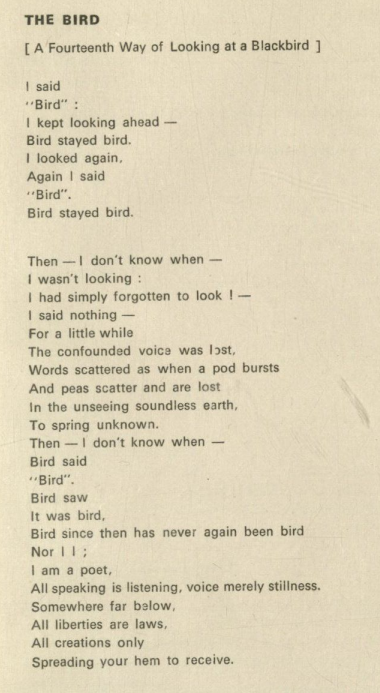For folks coming to my talk on “the politics of Afro-pessimism” — a list of things that I have been reading in preparation. (I will keep updating this list as we get closer to the conference) … and in case it’s not clear: the talk is designed to be critical of the theories calling themselves afro-pessimist.
Bibliography
Ansfield, Ben. “Still Submerged: The Uninhabitability of Urban Redevelopment.” Sylvia Wynter: On Being Human as Praxis. Ed. Katherine McKittrick. Durham: Duke University Press, 2015. 124-41. Print.
Bennetta, Jules-Rosette. “Afro-Pessimism’s Many Guises.” Public Culture 14.3 (2002): 603-5. Print.
Cesaire, Aime. Discourse on Colonialism. Trans. Joan Pinkham. New York: Monthly Review, 2000. Print.
Chandler, Nahum Dimitri. Toward an African Future–of the Limit of World. London: Living Commons Collective, 2013. Print.
Clegg, John J. “Capitalism and Slavery.” Critical Historical Studies 2.2 (2015): 281-304. Print.
da Silva, Denise Ferreira. “Before Man: Sylvia Wynter’s Rewriting of the Modern Episteme.” Sylvia Wynter: On Being Human as Praxis. Ed. Katherine McKittrick. Durham: Duke University Press, 2015. 90-105. Print.
Dangarembga, Tsitsi. Nervous Conditions. New York: Seal Press, 1988. Print.
Davies, Carole Boyce. “From Maquerade to Maskarade: Caribbean Cultural Resistance and the Rehumanizing Project.” Sylvia Wynter: On Being Human as Praxis. Ed. Katherine McKittrick. Durham: Duke University Press, 2015. 203-25. Print.
Day, Iyko. “Being or Nothingness: Indigeneity, Antiblackness, and Settler Colonial Critique.” Critical Ethnic Studies 1.2 (2105): 102-21. Print.
Eudell, Demetrius L. “‘Come on Kid, Let’s Go Get the Thing’: The Sociogenic Principle and the Being of Being Black/Human.” Sylvia Wynter: On Being Human as Praxis. Ed. Katherine McKittrick. Durham: Duke University Press, 2015. 226-48. Print.
Fanon, Frantz. The Wretched of the Earth. Trans. Constance Farrington. New York: Grove Press, 1963. Print.
Gordon, Lewis R. Bad Faith and Antiblack Racism. Amherst: Humanity Books, 1999. Print.
Hartman, Saidiya and Frank B. Wilderson III. “The Position of the Unthought.” Qui Parle 13.2 (2003): 183-201. Print.
Hartman, Saidiya. Scenes of Subjection: Terror, Slavery, and Self-Making in Nineteenth-Century America. New York: Oxford University Press, 1997. Print.
—. “Venus in Two Acts.” small axe, number 26 12.2 (2008): 1-14. Print.
Ingersoll, Thomas N. “Steve Martinot. The Rule of Racialization: Class, Identity,
Governance.” The American Historical Review 108.5 (2003): 1437-8. Print.
James, Joy. Resisting State Violence: Radicalism, Gender & Race in U.S. Culture. Minneapolis: University of Minnesota Press, 1996. Print.
Martinot, Steve and Jared Sexton. “The Avant-Garde of White Supremacy.” Social Identities 9.2 (2003): 169-81. Print.
Martinot, Steve. The Rule of Racialization: Class, Identity, Consciousness. Philadelphia: Temple University Press, 2003. Print.
Mbembe, Achille. “African Modes of Self-Writing.” Public Culture 14.1 (2002): 239-73. Print.
—. On the Postcolony. Berkeley: University of California Press, 2001. Print.
McKittrick, Katherine and Sylvia Wynter. “Unparalleled Catastrophe of Our Species? Or, to Give Humanness a Different Future: Conversations.” Sylvia Wynter: On Being Human as Praxis. Ed. Katherine McKittrick. Durham: Duke University Press, 2015. 9-89. Print.
McKittrick, Katherine. “Axis, Bold as Love: On Sylvia Wynter, Jimi Hendrix, and the Promise of Science.” Sylvia Wynter: On Being Human as Praxis. Ed. Katherine McKittrick. Durham: Duke University Press, 2015. 142-163. Print.
—. Sylvia Wynter: On Being Human as Praxis. Ed. Katherine McKittrick. Durham: Duke University Press, 2015. Print.
McKittrick, Katherine. “Yours in the Intellectual Struggle: Sylvia Wynter and the Realization of Living.” Sylvia Wynter: On Being Human as Praxis. Ed. Katherine McKittrick. Durham: Duke University Press, 2015. 1-8. Print.
Mignolo, Walter D. “Sylvia Wynter: What Does it Mean to Be Human?” Sylvia Wynter: On Being Human as Praxis. Ed. Katherine McKittrick. Durham: Duke University Press, 2015. 106-123. Print.
Morrison, Toni. Beloved. New York: Penguin, 1988. Print.
Moten, Fred. “Black Op.” PMLA 123.5 (2008): 1743-7. Print.
—. “Blackness and Nothingness (Mysticism in the Flesh).” The South Atlantic Quarterly 112.4 (2013): 737-80. Print.
—. “The Subprime and the beautiful.” African Identities 11.2 (2013): 237-45. Print.
Patterson, Orlando. Slavery and Social Death: A Comparative Study. Cambridge: Harvard University Press, 1982. Print.
Robinson, Cedric J. Black Marxism: the Making of the Black Radical Tradition. Chapel Hill: University of North Carolina Press, 2000. Print.
Rubio, Philip. “The Rule of Racialization: Class, Identity, Governance. By Steve Martinot.” Journal of Social History (2005): 1140-2. Print.
Saunders, Patricia J. “Fugitive Dreams of Diaspora: Conversations with Saidiya Hartman.”
Anthurium: A Caribbean Studies Journal 6.1 (2008). Web. 20 June 2016. <
http://scholarlyrepository.miami.edu/…
>.
—. Amalgamation Schemes: Antiblackness and the Critique of Multiracialism. Minneapolis: University of Minnesota Press, 2008. Print.
—. “People-of-Color-Blindness: Notes on the Afterlife of Slavery.” Social Text 28.2 (2010): 31-56. Print.
Sharma, Nandita. “Strategic Anti-Essentialism: Decolonizing Decolonization.” Sylvia Wynter: On Being Human as Praxis. Ed. Katherine McKittrick. Durham: Duke University Press, 2015. 164-82. Print.
Walcott, Rinaldo. “Genres of Human: Multiculturalism, Cosmo-politics, and the Caribbean Basin.” Sylvia Wynter: On Being Human as Praxis. Ed. Katherine McKittrick. Durham: Duke University Press, 2015. 183-202. Print.
Weheliye, Alexander G. Habeas Viscus: Racializing Assemblages, Biopolitics, and Black Feminist Theories of the Human. Durham: Duke University Press, 2014. Print.
Wilderson III, Frank B.
“We’re trying to destroy the world” Jared Ball, Todd Steven Burroughs and Dr. Hate. October 2014. 1-24. Print. 25 February 2016. <
http://imixwhatilike.org/2014/10/01…—. “Grammar & Ghosts: the Performative Limits of African Freedom.” Theatre Survey 50.1 (2009): 119-25. Print.
—. “Gramsci’s Black Marx: Whither the Slave in Civil Society?” Social Identities 9.2 (2003): 225-40. Print.
—. Incognegro: A Memoir of Exile and Apartheid. Durham: Duke University Press, 2015. Print.
—. Red, White & Black: Cinema and the Structure of U.S. Antagonisms. Durham: Duke University Press, 2010. Print.
—. “The Prison Slave as Hegemony’s (Silent) Scandal.” Social Justice 30.2 (2003): 18-27. Print.

